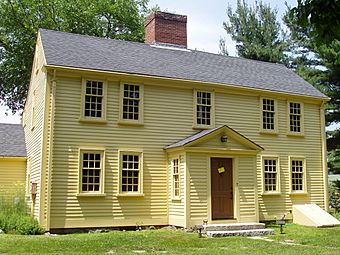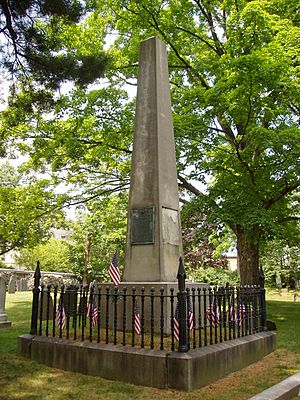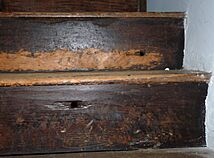Jason Russell House facts for kids
|
Jason Russell House
|
|
|
U.S. Historic district
Contributing property |
|

The Jason Russell House
|
|
| Location | 7 Jason St. Arlington, Massachusetts |
|---|---|
| Part of | Arlington Center Historic District (ID85002691) |
| NRHP reference No. | 74000363 |
Quick facts for kids Significant dates |
|
| Added to NRHP | October 9, 1974 |
| Designated CP | September 27, 1985 |
The Jason Russell House is a historic home in Arlington, Massachusetts. It is famous because a deadly fight happened there on April 19, 1775. This was the first day of the American Revolutionary War, during the Battles of Lexington and Concord. On that day, at least twelve colonial fighters died in and around the house.
In 1923, the Arlington Historical Society bought the house to save it. They restored it and now run it as a museum where visitors can learn about its important history.
Contents
Building the House
A farmer named Jason Russell built this house around 1745. It was a typical New England farmhouse for its time, with a large central chimney. The house was built using some wood from an even older family building from the 1680s.
Today, the main part of the house looks much like it did in the 1700s. The kitchen, parlor, and the bedrooms above them are mostly unchanged. If you visit, you can still see the original decorative painting on the kitchen ceiling.
The Battle of April 19, 1775
The Jason Russell House became a key battle site as British soldiers, known as "redcoats," marched back to Boston from Concord. The day turned into a running battle, and the fighting in Arlington (then called Menotomy) was especially fierce.
Jason Russell, the owner of the house, was 59 years old and had a limp. He lived there with his wife, Elizabeth, and their children. On that day, men from nearby towns like Beverly, Danvers, and Salem joined him to fight the British.
Setting the Stage for a Fight
The night before, riders like Paul Revere and William Dawes had galloped past the house. They were warning everyone that the British army was on the move. This warning system used bells, drums, and bonfires to alert the colonial militias. Militias were groups of ordinary citizens who trained as soldiers to defend their towns.
By the afternoon of April 19, many militia companies had arrived in Menotomy. Jason Russell, after taking his family to a safer place, returned to his home. He and other colonial fighters used piles of wooden shingles to build a small barricade. They thought it would be a good spot to fire on the British troops as they passed.
Other groups of soldiers hid behind a stone wall and among the trees in the orchard behind the house. They were all waiting to ambush the returning British army.
The Battle at the House
The colonial fighters made a critical mistake. They didn't realize the British had sent out "flanking parties." These were groups of soldiers who moved along the sides of the main road to protect the main army from surprise attacks.
Around 4:00 PM, the British flankers surprised the colonial militia from the sides and behind. The colonists, who were from many different towns and didn't have one single commander, were caught off guard. A chaotic and intense fight began.
Some men, like Daniel Townsend and Timothy Munroe from Lynn, were firing from the yard. When they saw the flankers, they ran into the house to escape. Townsend jumped through a window but was killed outside. Munroe followed and managed to run away, even though a bullet hit his leg and many more tore through his clothes.
Jason Russell was one of the last to run for the safety of his house. Because he was older and had a limp, he was shot and killed right at his own doorstep.
Inside the House
The fighting moved inside the house. Some colonial soldiers rushed in, hoping to find cover. Eight men managed to hide in the basement and survived. They were able to defend the basement door from the British soldiers.
Upstairs, the fighting was deadly. The house was filled with smoke and the sounds of battle. When it was over, the house was riddled with bullet holes, many of which can still be seen today. The battle at the Jason Russell House was one of the bloodiest encounters of the day. More colonial soldiers died here than at any other spot along the battle road.
After the Battle
When the fighting stopped, the survivors had a sad task. They gathered the bodies of the colonial soldiers who had been killed in the area and brought them into the Russell house. Mrs. Russell returned to find her husband and eleven other men lying on her kitchen floor.
The twelve men were buried together in a single grave in the town's nearby cemetery. At first, only three of the men could be identified: Jason Russell and two other local men, Jabez Wyman and Jacob Winship. Years later, the names of the other nine men from different towns were figured out. In 1848, a monument was built over their grave to honor their sacrifice.
The Russell Family's Story
On the same day that Jason Russell died, his granddaughter, Anna, was born to his son Thomas. Sadly, the baby died soon after. Jason's wife, Elizabeth, continued to live in part of the house until she died in 1786.
The house has a modern connection to Hollywood. In July 2025, actor Kurt Russell visited the house. He had discovered through family research that Jason Russell was his great-great-great-great-great-grandfather.
See also
- Battle of Menotomy
- Dedham, Massachusetts in the American Revolution
- National Register of Historic Places listings in Arlington, Massachusetts



